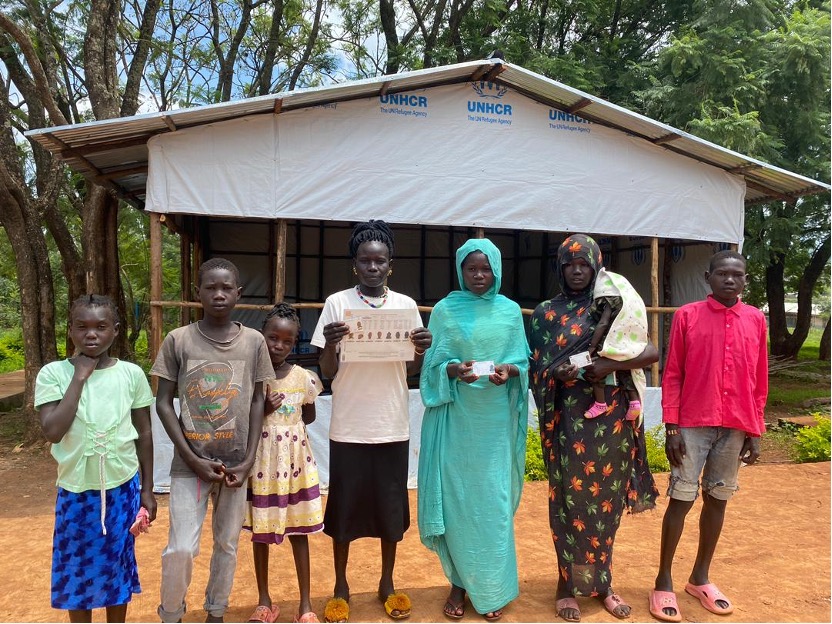Over 9,000 Sudanese Refugees Receive Digital IDs in Ethiopia
Over 9,000 Sudanese Refugees Receive Digital IDs in Ethiopia

Sudanese refugees receive documentation in Benishangul-Gumuz region in Ethiopia
Overview
The National ID Program (NIDP) is a flagship initiative that sits under the Ethiopia Prime Minister’s Office. The World Bank has committed USD 350 million to support Ethiopia’s NIDP to increase access to services and economic opportunities. View more information on the World Bank Ethiopia Digital ID for Inclusion and Services Projects. This funding aims to support millions of Ethiopians and refugees in enhancing their access to services and systems including in the formal economy, such as opening bank accounts, accessing health insurance, receiving cash transfer and subsidies. World Bank assistance is expected to be channeled to the NIDP to support the roll-out of voluntary registration and ID issuance across the country, the development of secure and energy-efficient ICT infrastructure, the establishment of a Personal Data Protection Commission and digital transformation of public and private sector services that integrate with Fayda. The project will also specifically support accelerated financial inclusion, adaptive social protection, and access to mainstreamed services for refugees.
To facilitate this refugee inclusion, UNHCR, the Refugees and Returnees Service (RRS) and the National ID Program (NIDP) signed a tripartite data sharing agreement in October 2023, which led to the signing of tripartite Standard Operating Procedures (SOPs) in January 2024. The issuance of unique national ID numbers (called the Fayda Identification number) and QR codes to refugees and asylum-seekers is done electronically by NIDP. The Fayda ID was established under Proclamation #1284/2023 as a foundational legal ID for Ethiopia. The number and QR code are then transferred to the Refugee and Returnees Service (RRS) and UNHCR refugee registration system “proGres” and inserted on the new refugee ID cards and Proof of Registration (POR). The new refugee ID cards with Fayda number and QR code will have a validity of five years. Previous refugee ID cards had a validity of three years and have not been issued since November 2021 when a state of emergency was declared in Ethiopia as a result of the conflict in northern Ethiopia.
As of June 2025, over 65,169 refugees have received Fayda numbers either on their new refugee ID cards or on their issued family document POR, including 9,619 Sudanese refugees.
With this new ID card, refugees will be able to access national services, including health and education. Refugees will be able to access work, including legalizing their businesses by requesting a Tax Identification Number (TIN) from the Ministry of Revenue in line with the 2019 Refugee Proclamation, as per Article 26, which affords refugees the right to work.
Sustainability and Solutions
Currently in Ethiopia, more than 90% of refugees aged 14 years or older have expired refugee ID cards or do not have ID cards. Lack of documentation exposes them to heightened protection risks and limits their freedom of movement and financial inclusion opportunities.
This groundbreaking initiative between RRS, NIDP and UNHCR will lead to significant protection and solutions dividends, as it will enhance the protection space, support refugee social and economic inclusion and facilitate their access to services. This investment in documentation will also enable refugees to obtain exit permits for the purposes of resettlement and other complementary pathways (like family reunification and private sponsorship).
The refugee ID cards will further advance refugee access to financial inclusion, including opening bank accounts, buying mobile phone SIM cards, receiving funds from microfinance institutions, and accessing job opportunities. UNHCR, RRS and the NIDP will raise awareness with microfinance institutions, banks and telecom agencies to ensure recognition of the newly issued refugee ID cards, which have features of the national ID card.
Profile of the Target Population
A total of approximately 48,000 Sudanese refugees, aged 5 years and above, are eligible to receive the Fayda numbers in their refugee documentation (family document ‘Proof of Registration’ and individually issued ID cards for eligible refugees aged 14 years and above). EU INTPA and other partners are supporting these efforts as part of broader efforts to respond to the Sudan emergency in Ethiopia.
For more information, please contact David Karp, Assistant Representative, UNHCR Ethiopia ([email protected]).
